California lawmakers vote to end travel ban to states with anti-LGBTQ laws
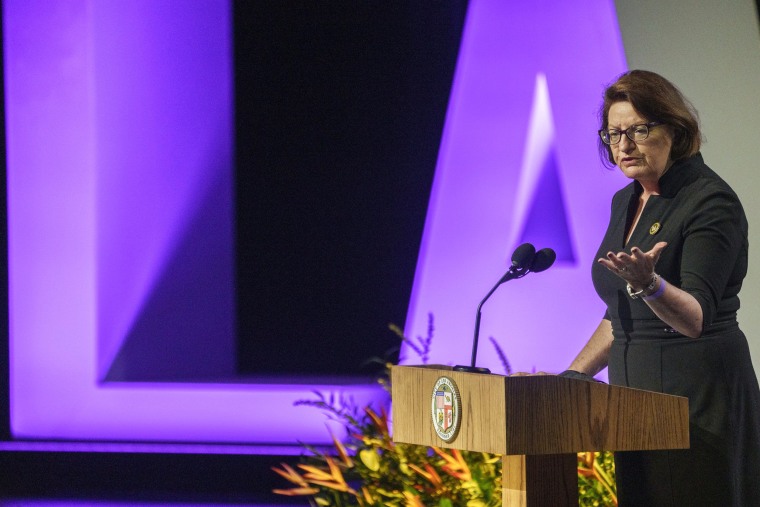
SACRAMENTO, Calif. — California may soon lift a ban on state-funded travel to states with anti-LGBTQ laws and instead focus on an advertising campaign to bring anti-discrimination messages to red states.
California started banning official travel to states with laws it deemed discriminatory against LGBTQ people in 2017, starting with Kansas, Mississippi, North Carolina and Tennessee. Since then, the list has grown to include a total of 26 states, most of them Republican-led, following a surge of anti-LGBTQ legislation these past few years.
The prohibition has prevented elected officials, state workers and university scholars from traveling to more than half of the country using the state’s money. That has posed a significant challenge to sports teams at public colleges and universities, which have had to find alternative funding sources to pay for their road games in states like Arizona and Utah. It has also complicated some of the state’s other policy goals, like using state money to pay for people who live in other states to travel to California for abortions.
California lawmakers in the state Assembly on Monday passed legislation to end the travel ban. The bill, introduced by state Senate leader Toni Atkins, would also establish an outreach and advertising campaign in states on the travel ban list to promote pro-LGBTQ messages. Atkins, who is a lesbian, said the travel ban has helped raise awareness about many anti-LGBTQ issues, but it has also led to unintended consequences.
For more from NBC Out, sign up for our weekly newsletter .
“In many instances, the travel ban has inadvertently caused California to isolate its services and citizens in a time when we are leading the nation in ensuring inclusivity and freedom,” said Democratic Assemblymember Rick Zbur, the former executive director of the advocacy group Equality California. “With nearly 500 anti-LGBTQ bills having been introduced in legislatures nationwide this year alone, now more than ever, we need to reach into those communities with messages of support, inclusivity and understanding.”
Some Republicans voted against overturning the ban, but there was no debate.
The bill will head to the Senate for a final vote before landing on Gov. Gavin Newsom’s desk. The Democratic governor has until Oct. 14 to decide whether to sign it into law. The governor’s office did not immediately return a request for comment about the legislation.
The reversal on the travel ban comes amid intense political battles across the country over transgender rights, including efforts to impose bans on gender-affirming care , bar trans athletes from girls and women’s sports, and require schools to notify parents if their children ask to use different pronouns or changes their gender identity.
The legislation is among nearly 1,000 bills that lawmakers have been debating during the hectic final two weeks of the Legislative session. The Legislature has until Sept. 14 to act on these bills.

Stay Informed. Stay Connected.
- View Calendar
- Submit an event
- Read 10-Second Bios
- Submit Your 10-Second Bio
- Classes and Workshops
- Submit an Article

Submit a Shout-Out
- Link commenting guidelines
- Oakland digital signage system
Additional states added to travel restrictions
The list of states subject to California’s ban on state-funded and state-sponsored travel was updated once again on July 19, 2022. The current list of restricted states follows (bolding reflects new additions).
- Arizona – Effective 9/28/22
- Louisiana – Effective 8/1/22
- Mississippi
- North Carolina
- North Dakota
- South Carolina
- South Dakota
- West Virginia
What is the travel restriction?
On September 27, 2016, Governor Jerry Brown signed into law Assembly Bill No. 1887 (AB1887). The travel restriction prohibits state-funded travel to states that have passed a law after June 26, 2015, that:
- Has the effect of repealing existing state or local protections against discrimination on the basis of sexual orientation, gender identity or gender expression; or
- Authorizes or requires such discrimination.
How are “state funds” defined?
State funds have been identified by the systemwide budget office as encompassing all State General Funds and State Special Fund appropriations to a campus, e.g. D9900. If you are unsure, check with your designated budget coordinator.
What does it mean for travel to be “state-funded”?
The statute does not define the term “state-funded.” UC Legal has interpreted the restriction on the use of state funds to apply to direct expenditures for travel-related costs (e.g. hotel and transportation), but not the salaries or time spent by employees who travel to one of the identified states.
If an outside entity is funding (reimbursing UC) the travel to one of the prohibited states, is it permissible to reimburse the traveler using these funds?
- Assuming the outside entity (third party) is not a California state entity, then:
- The third party itself wouldn’t have any burden of complying with AB 1887; and
- The third party can pay for the travel directly or give UC the money for UC’s use in reimbursing the employee for travel expenses.
The travel restriction went into effect on Jan. 1, 2017. For more information, please refer to the California Attorney General’s website or BRC Travel & Entertainment.
Have a question about this announcement? Contact the Business Resource Center
Leave your comment here
Name: Email: Website:
Upcoming Events
Tuesday, june 18.
• Red Cross Blood Drive • Morning Meditation • Getting to Know You: IT Client Services • Contributions of Colored Troops to the Civil War • BRC T&E Team’s New/Infrequent Traveler’s Presentation
WEDNESDAY, JUNE 19
• UCOP Holiday: Juneteenth
THURSDAY, JUNE 20
• Morning Meditation • Compliance, Accounting, Audit, & Policy (CAAP) Office Hours • Latinx Staff Association Meeting • Embracing a Democracy Worthy of the Human Spirit • Lakeside Speakeasy Toastmasters Club • Accessibility/Cascade Office Hours
FRIDAY, JUNE 21
• Activating Our Liberation! • People Leader Forum – Leadership Development Overview
MONDAY, JUNE 24
• Allies for All Abilities (3A) Affinity Group Meeting
Explore UCOP’s culture
Submit a 10-second bio.
Introduce yourself to the OP community — it takes just a few minutes.
Want to say thank you to a colleague? Take a moment to do so in Link.
UCOP website
UCOP Ombuds Office
Navigating UCOP
UCOP careers

- Skip to main content
- Keyboard shortcuts for audio player
California reconsiders its state business travel ban to states with anti-LGBTQ+ laws
Nicole Nixon / CapRadio
California law bans state business travel to other states with discriminatory laws against LGBTQ+ people. With 26 states now on the list, lawmakers are talking about repealing the travel ban.
Copyright © 2023 NPR. All rights reserved. Visit our website terms of use and permissions pages at www.npr.org for further information.
NPR transcripts are created on a rush deadline by an NPR contractor. This text may not be in its final form and may be updated or revised in the future. Accuracy and availability may vary. The authoritative record of NPR’s programming is the audio record.
California Set to End Travel Ban to States With Anti-LGBTQ Laws
- Law from 2017 bars travel to 26 mostly Republican states
- Bill would replace ban with pro-LGBTQ advertising campaign

California instead is introducing a new bill, called the BRIDGE Project, to seek to reach out to residents in those states and foster a culture of inclusion and respect.
California lawmakers voted to reverse a ban on government-sponsored travel to mostly Republican-led states with discriminatory laws targeting LGBTQ people, acknowledging that the policy had failed to stop a surge of legislation across the US.
The ban, enacted in 2017, applied to state agencies, departments, boards and schools that are part of the University of California and the California State University systems. It prohibited them from using state funding to travel to states that had passed laws such as barring transgender people from participating in school sports or using the bathroom of their gender identity, ultimately affecting 26 states.

California Senate approves ban on schools notifying parents of their child’s pronoun change

California Legislature Gender Identity
SACRAMENTO, Calif. (AP) — School districts in California would be barred from requiring teachers to notify parents if their child asks to go by a new pronoun at school under a bill the state Legislature is weighing amid legal battles over the rights of parents and gender-nonconforming students.
The state Senate approved the proposal Thursday, which would ban school districts from passing or enforcing policies requiring school staff to disclose a student’s gender identity or sexual orientation to anyone else without the child’s permission, with some exceptions. The goal is to protect students whose safety could be threatened if they live in unwelcoming households.
The issue is personal to Kai, a transgender man who recently graduated from high school within the Rocklin Unified School District near Sacramento and was treated for suicide attempts before coming out. He confided in a teacher “who had displayed her dedication and empathy toward all her students,” Kai said at a news conference last month.
“Having a trusted adult is paramount to ensuring a queer kid makes it to their next birthday,” he said. “If you care about kids, you’ll enact this legislation that will protect their well-being and protect their lives.”
Lawmakers approved the legislation along party lines after more than an hour of an emotional debate in which Democratic LGBTQ+ senators recounted stories about how they delayed coming out to their parents or were outed by someone else. They argued gender-noncomforming students should be able to come out to their families on their own terms. But Republican lawmakers said the state shouldn’t dictate whether school districts can enforce so-called parental notification policies and that schools have an obligation to be transparent with parents.
It is part of a nationwide debate over local school districts and the rights of parents and LGBTQ+ students. States across the country have sought to impose bans on gender-affirming care, bar trans athletes from girls and women’s sports, and require schools to “out” trans and nonbinary students to their parents. Some lawmakers in other states have introduced bills in their legislatures with broad language requiring that parents be notified of any changes to their child’s emotional health or well-being.
Republican state Sen. Kelly Seyarto, who represents Murrieta in Southern California, said schools should increase transparency with parents by notifying them of their child’s gender identification change.
“If we include the parents, that’s the best way to take something from people being angry and mad to developing a solution that works for everybody,” he said.
California officials shouldn’t prevent all parents from being notified because of the possibility that some parents may react badly, said Greg Burt, vice president of the California Family Council, a conservative Christian advocacy group.
“You don’t assume that all parents are unsafe,” Burt said. “That shouldn’t be the assumption.”
The bill now heads to the state Assembly, where it would need to pass in committees and on the floor before it can reach the desk of Democratic Gov. Gavin Newsom, whose administration has fought school boards over the notification policies.
The debate over the policies is playing out in court cases across the state.
In August, Attorney General Rob Bonta, a Democrat, sued the Chino Valley Unified School District over the district’s notification rule, arguing it discriminated against gender-nonconforming students. A judge tentatively blocked parts of the policy, and the district later updated the rule to apply more broadly to when a child requests any change to their student records.
But in a case involving the Escondido Union School District in Southern California, a judge tentatively ruled to prevent the district from reprimanding teachers for notifying parents about their child’s gender identification change.
State Sen. Caroline Menjivar, who is lesbian, said on the Senate floor Thursday that she was outed to her mother when Menjivar was 16 years old.
“I came home to literally all my things on the front lawn, because I was kicked out,” the Democrat representing the San Fernando Valley said. “That’s what happens when parents don’t accept queer kids.”
Menjivar then went back into the closet so that she could continue living at home, she said. She didn’t come out again to her mother until she was 25 years old. Her mother is still not accepting, Menjivar, now 35, said.
“There are many queer kids in California who have these stories,” she said.
Austin is a corps member for The Associated Press/Report for America Statehouse News Initiative. Report for America is a nonprofit national service program that places journalists in local newsrooms to report on undercovered issues. Follow Austin on the social platform X: @sophieadanna
By SOPHIE AUSTIN Associated Press/Report for America
Events Dining Guide
Classifieds, audio programs.
Tired and confused, first migrants reach California border after Biden’s asylum order
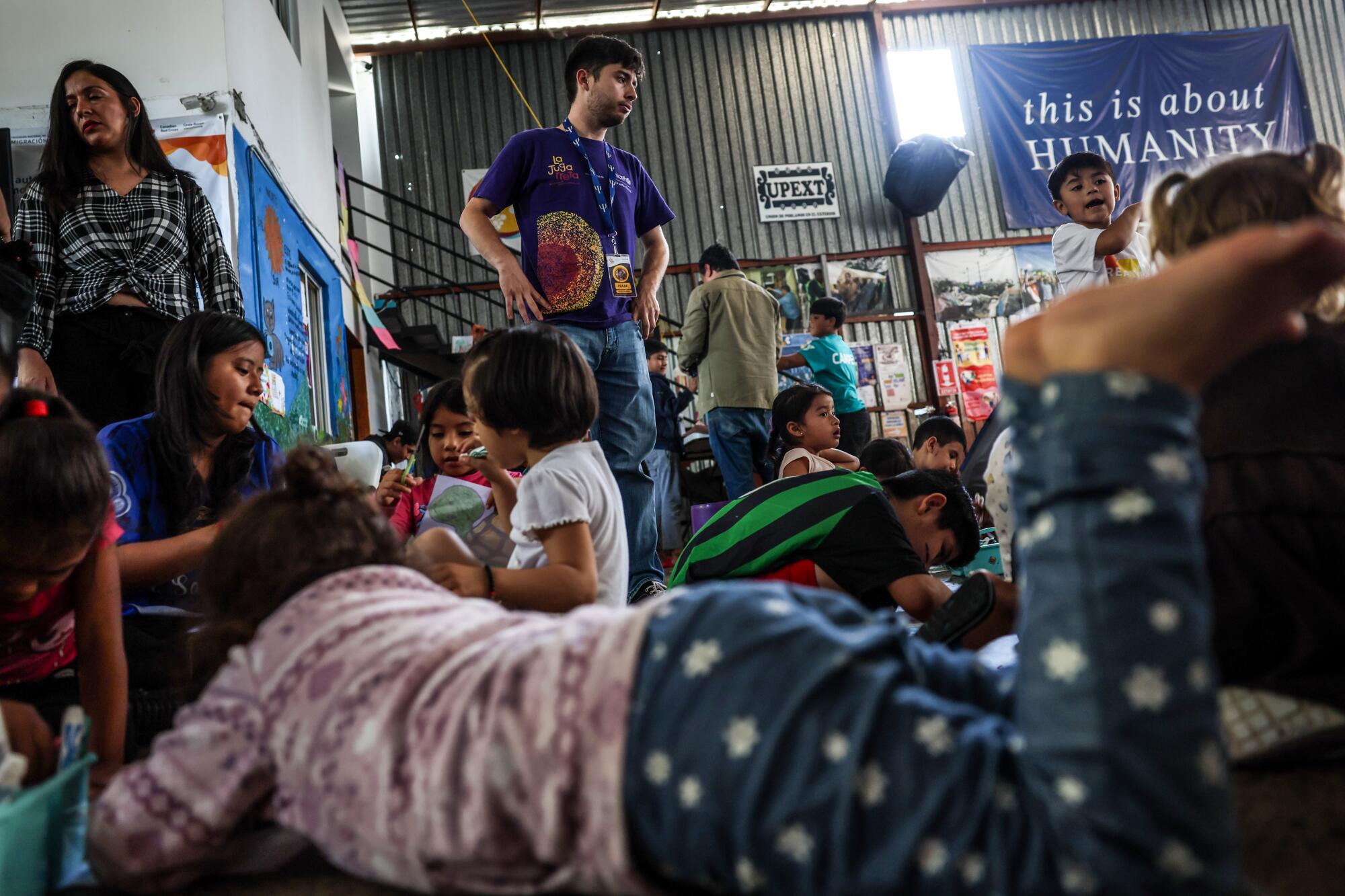
- Show more sharing options
- Copy Link URL Copied!
Shortly after President Biden’s executive order to restrict asylum access took effect late Tuesday, 50 migrants completed a nine-hour trek through the mountains just north of Tecate, Mexico.
They lined up single file against the brush, in a dusty clearing steps from Highway 94, and waited for Border Patrol agents to pick them up. The migrants, a group including men, women and children from Cuba, Ecuador, China and Brazil, were exhausted, nearly out of food and water.
Many hadn’t heard of the order, which raises the legal standard for asylum claims and blocks access for those crossing the border illegally when average arrests are higher than 2,500 a day.

World & Nation
Biden signs order tightening border with Mexico when crossings surge
President Biden signs an executive order allowing him to close the border with Mexico outside official ports of entry when crossings are high, with few exceptions.
June 4, 2024
Lucas Lu, 32, did know about it and worried he had arrived too late to seek asylum. The rule goes against American values, he said.
“It’s not fair,” he said, sitting with his legs crossed in the dirt. “We risked our lives to get here.”
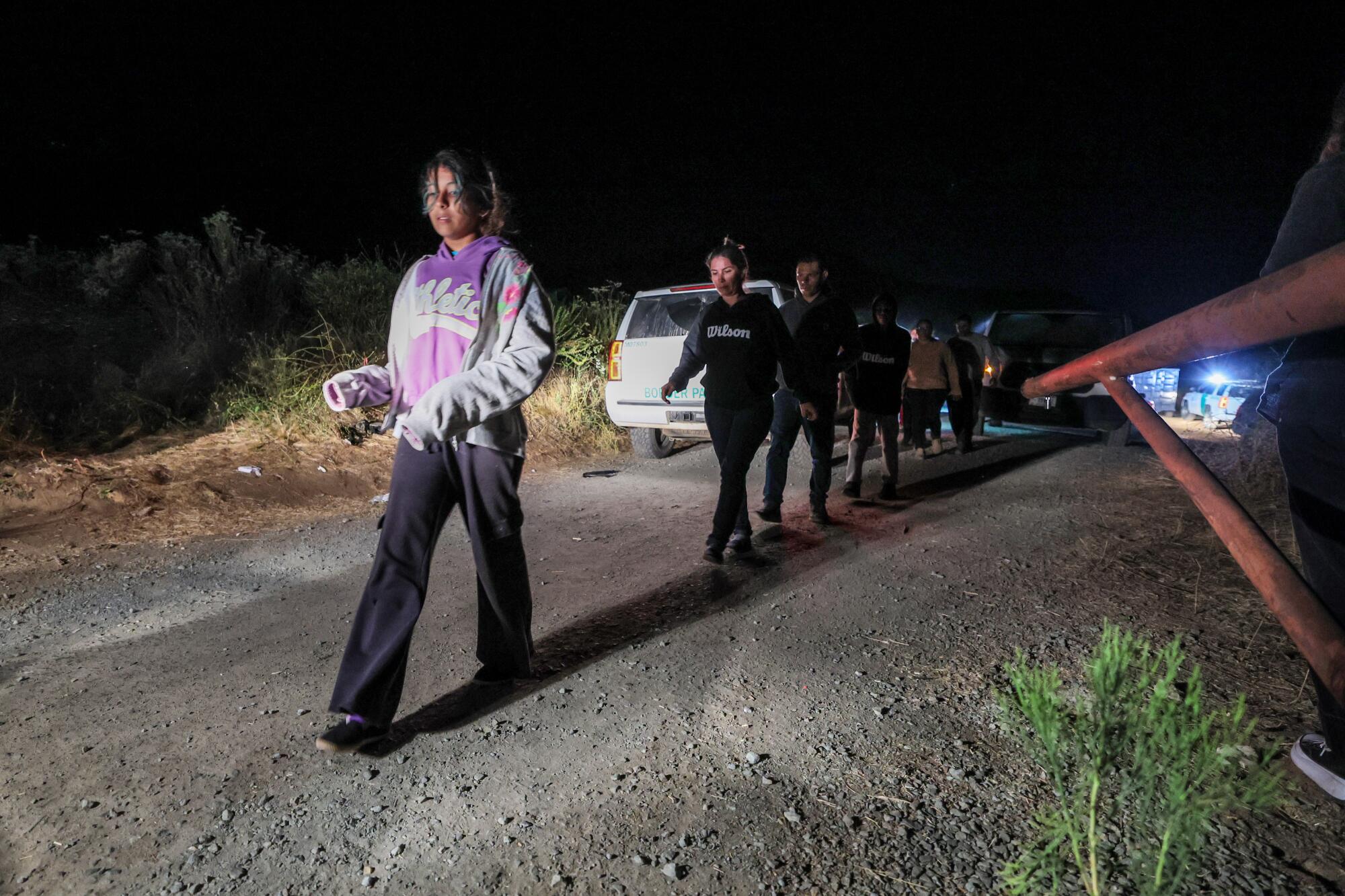
The Chinese former hotel manager had a back brace wrapped around his T-shirt and leaned on a walking stick. He said he had sustained a spinal injury while traveling by boat in Panama. Getting to the southern border had taken him three months.
Lu said he was fleeing authoritarian repression in search of safety, dignity and the ability to speak freely without the threat of jail.
Just past 11 p.m. three sprinter vans and five other vehicles pulled up to the site.
“ Gracias a Dios ,” one woman exclaimed in the dark. “Thank God.”
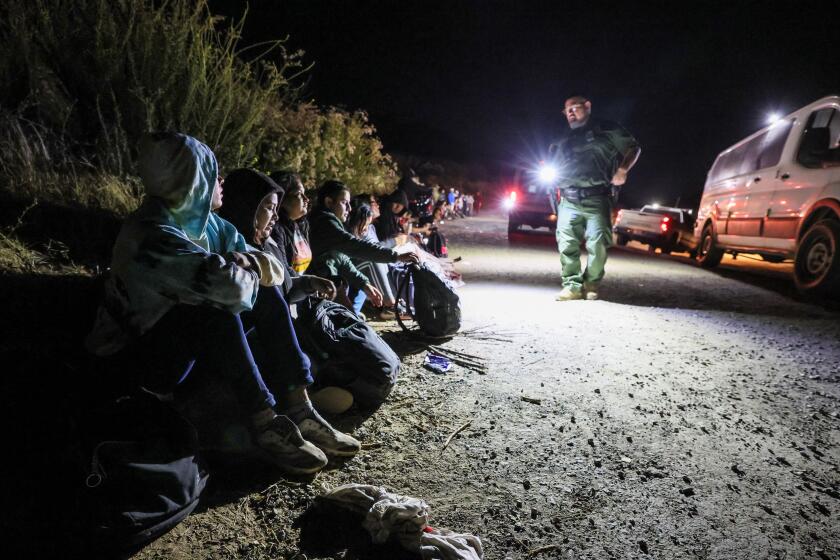

Photos: A visual report from the border following President Biden’s rollout of asylum restrictions
Photos of first migrants reaching California border after Biden’s asylum order
June 6, 2024
The agents brought out trash bags and told the migrants to dump their food and water. One picked up Lu’s walking stick and hurled it into the brush.
“None of this, OK?” he said.
They patted migrants down and loaded them into the vans. An additional 45 migrants were coming down the hill, one agent said, plus groups of 40 and 90 in other areas.
Before and after the order took effect at 9 p.m. Pacific time, the night appeared relatively quiet overall, with many of the crossing sites east of San Diego deserted.
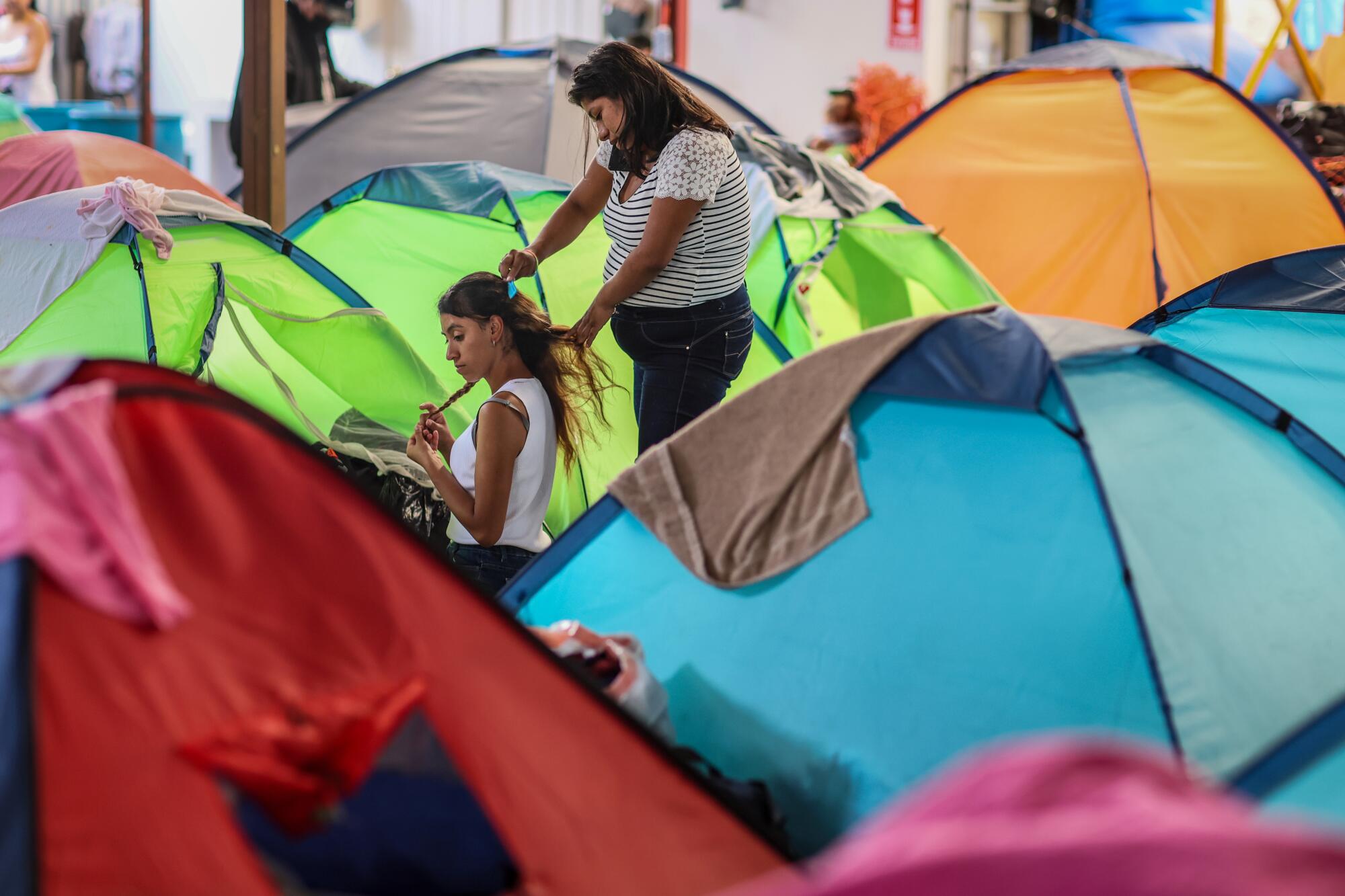
After migrant arrivals rose, making San Diego the top sector across the border, arrests dipped again in recent weeks.
But the daily average of arrests between official ports of entry remains above the 2,500 threshold.
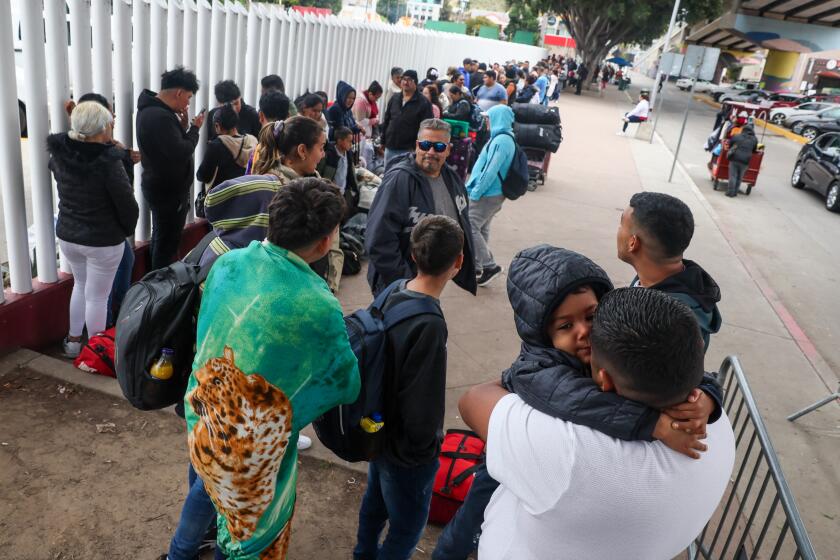
San Diego is now the top border region for migrant arrivals
For first time in 25 years, San Diego is the top spot in the nation for migrant border crossings, surpassing Tucson.
April 25, 2024
During a call with reporters Wednesday, a senior Department of Homeland Security official said the day started with just over 9,000 people in custody who were arrested before the order took effect — on par with average figures over the last month. The agency didn’t see a significant increase in arrivals of migrants trying to beat the deadline.
Since then, migrants have been removed pursuant to the order, the official said, declining to provide figures. The agency is ramping up efforts to maximize the impact of the order in the coming weeks.
Migrants from Mexico can be quickly returned, and the Mexican government previously agreed to accept some migrants from Venezuela, Nicaragua, Haiti and Cuba. The official acknowledged it will remain challenging to remove migrants from other countries, such as China, that don’t regularly accept deportation flights.
In Tijuana, Jose Garcia Lara, director of the Movimiento Juventud 2000 shelter, worries the executive order could cause a crisis as migrants become bottlenecked in northern Mexico.
The shelter, which has capacity for 200 people, had seen about 60 people daily, Garcia Lara said. In recent days, that number had gone up to 100.
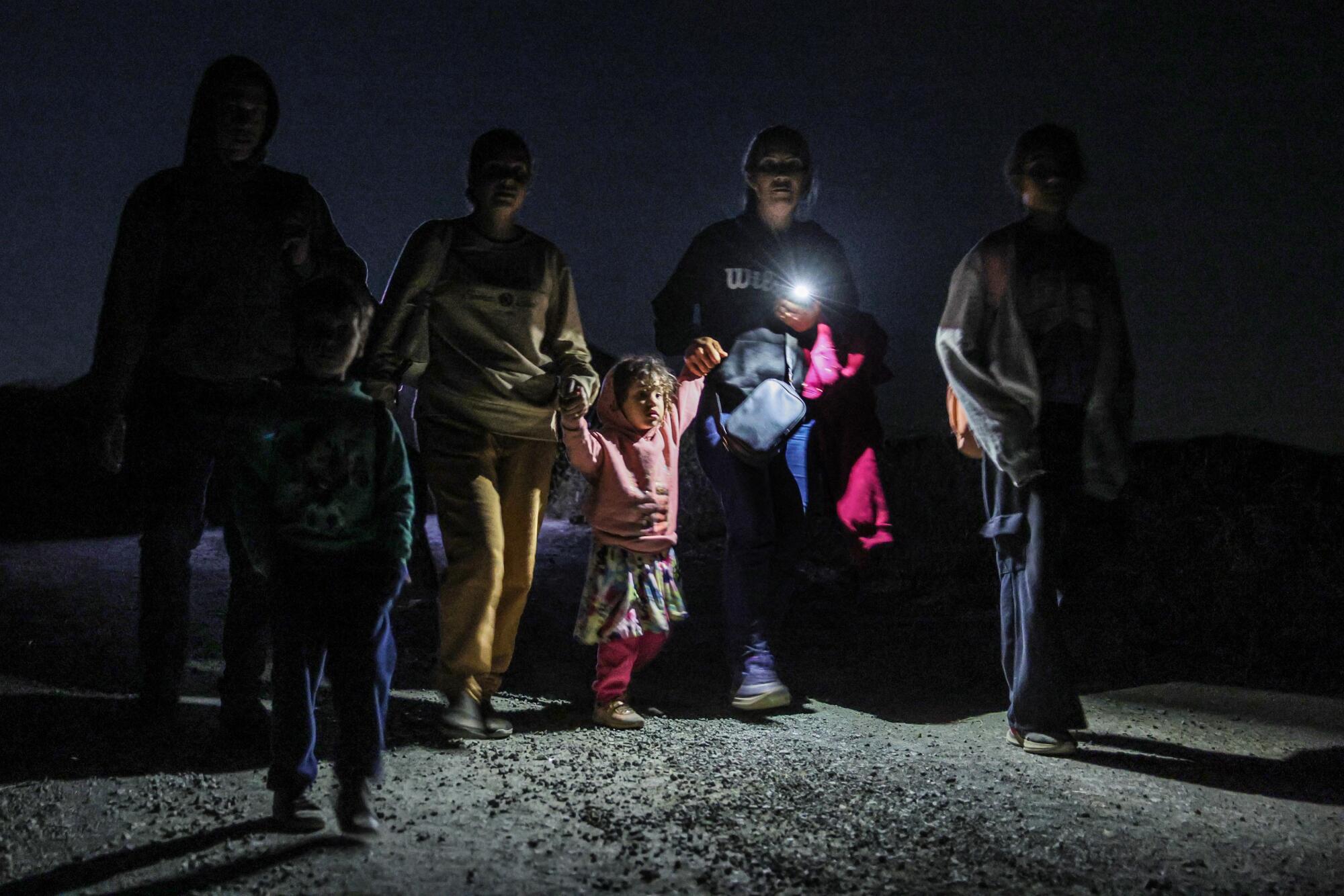
Garcia Lara said the shelter numbers tend to be low when more people choose to cross the border illegally. Shelter residents are those waiting for an appointment with border agents through the U.S. Customs and Border Protection phone app, which is glitchy and slow .
He remembers the arrivals of Haitians in 2016, the caravans of Central Americans after that, the way the pandemic-era border rule kept migrants out of the U.S. and crowded in Mexican shelters.
Recently, migrants have shown up not just from the Western Hemisphere but from all over the world — and they’ll keep coming, he said. “We’re used to it,” he said. “What we’ll do is receive them.”
Rosario de Leon, 38, from Mexico’s Chiapas state and her wife, Gracia Cortez, 27, from El Salvador have waited two months for an appointment. They said they had faced discrimination as a gay couple, including in Tijuana, and fled gang extortion.
Cortez said the new rule is fair. Hopefully, it means more appointments could open up through the app, she said.
“It’s not fair that someone enters irregularly while others are following the rules,” she said. “We all need to be patient.”
Across the border at a trolley station in San Ysidro, Mariela Diaz, 28, waited Tuesday afternoon for her husband to be released from federal custody.
Diaz, from Colombia, charged her phone and caught up on the news of the executive order.
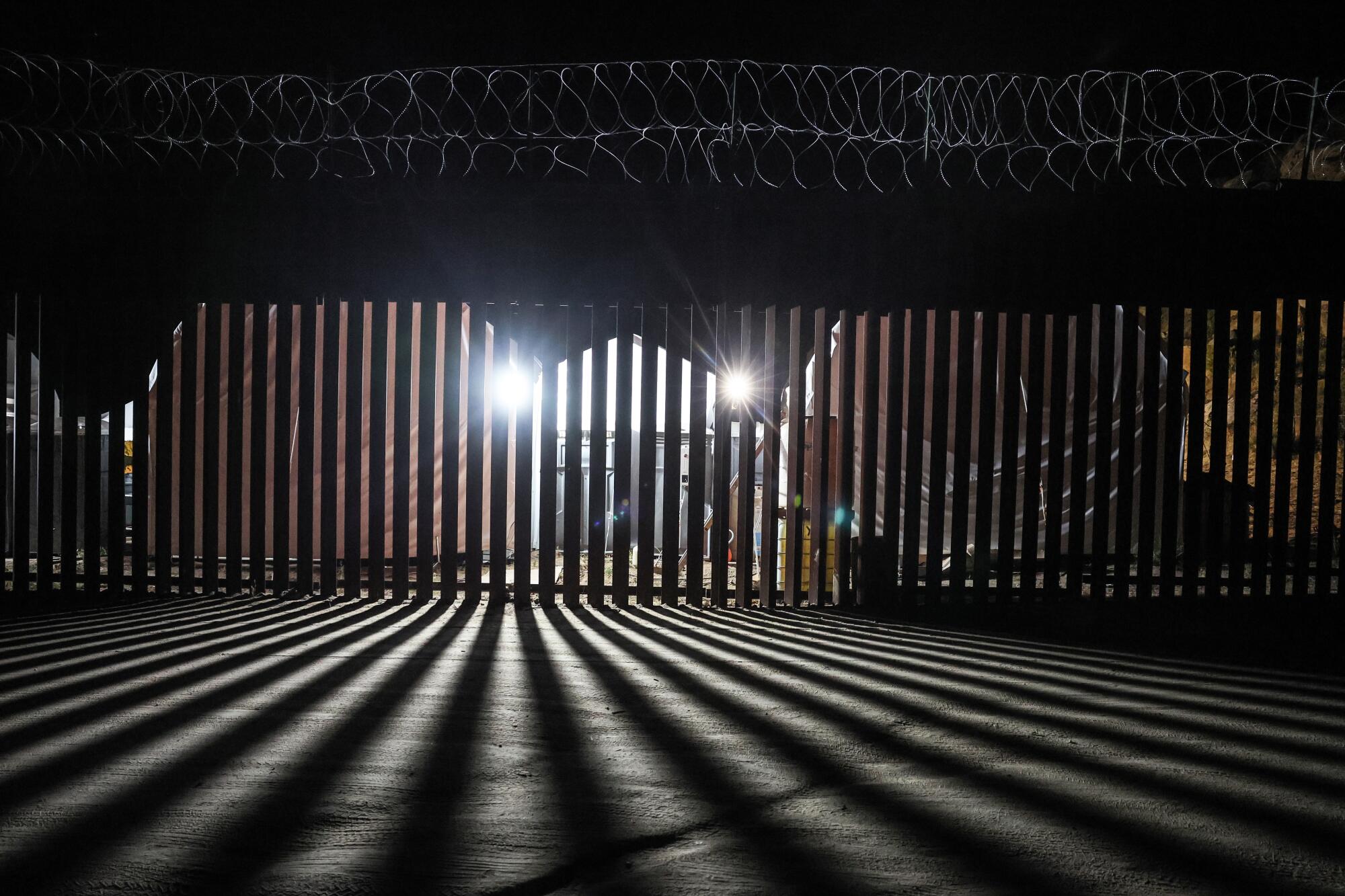
“I’m an immigrant, but it’s also something that is getting out of control,” she said. “I understand the president’s decision.”
She was relieved she arrived before the order took effect. Still, she felt for those who would arrive too late.
More to Read
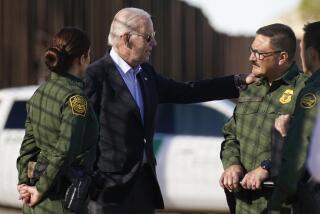
Opinion: Why Biden’s new border plan is a terrible idea

News Analysis: Why Biden’s order on the ‘out of control’ border may not fix Democrats’ political problem

Migrants from around the world have made this stretch of California the top place to enter the U.S. illegally
May 16, 2024
Get the L.A. Times Politics newsletter
Deeply reported insights into legislation, politics and policy from Sacramento, Washington and beyond. In your inbox three times per week.
You may occasionally receive promotional content from the Los Angeles Times.

Andrea Castillo covers immigration. Before joining the Los Angeles Times, she covered immigrant, ethnic and LGBTQ+ communities for the Fresno Bee. She got her start at the Oregonian in Portland. A native of Seattle, she’s been making her way down the West Coast since her graduation from Washington State University.
More From the Los Angeles Times
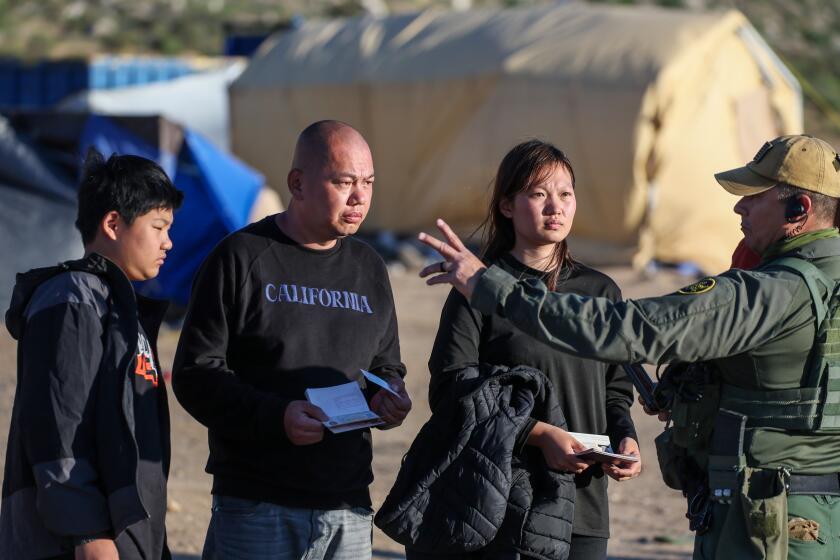
Ecuador moves to restrict U.S.-bound Chinese migrants, many of whom cross at California
June 18, 2024

Immigrant spouses of U.S. citizens protected from deportation under Biden’s latest action

Trump blasts immigrants for taking jobs as he courts voters in Michigan
June 15, 2024
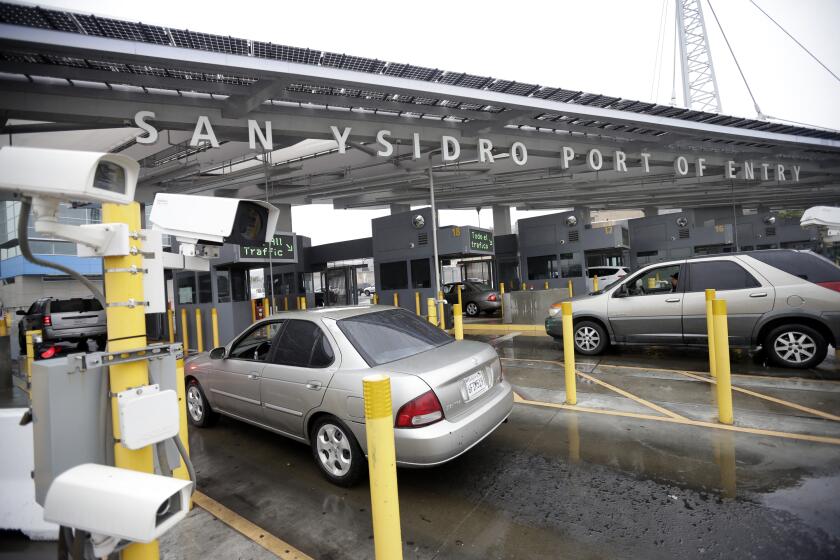
Ex-U.S. Customs officer convicted of letting drug-filled cars enter from Mexico
June 13, 2024
- Share full article
Advertisement
Supported by
California Joins Growing National Effort to Ban Smartphone Use in Schools
Gov. Gavin Newsom called for a statewide ban as states and large school districts have pursued similar prohibitions to prevent disruption and cyberbullying.

By Shawn Hubler
Reporting from Sacramento
Gov. Gavin Newsom called on Tuesday for a statewide ban on smartphone use in California schools, joining a growing national effort to curb cyberbullying and classroom distraction by limiting access to the devices.
Mr. Newsom, who has four school-age children, said he would work this summer with state lawmakers to dramatically restrict phone use during the school day in the nation’s most populous state. His directive came hours before board members at the Los Angeles Unified School District, the country’s second-largest school district, voted to pursue their own smartphone ban that could begin in January.
“When children and teens are in school, they should be focused on their studies, not their screens,” Mr. Newsom said in a statement.
The effort to curb devices on campus has transcended political lines, as Republican-led states like Florida and Indiana already have instituted their own restrictions. New York City leaves it up to individual campuses to determine their own policies after dropping a blanket cellphone ban in 2015, but Gov. Kathy Hochul said last month that she would pursue a statewide prohibition in 2025.
The moves in California followed a call this week for warning labels on social media platforms by the U.S. surgeon general, Dr. Vivek Murthy, who argued that they were fueling a mental health crisis among adolescents.
“Adolescents who spend more than three hours a day on social media face double the risk of anxiety and depression symptoms,” Dr. Murthy wrote on Monday in an opinion piece for The New York Times. “And the average daily use in this age group, as of the summer of 2023, was 4.8 hours.”
Many school districts in California already have restrictions on cellphone use during the school day, but enforcement can be a challenge for teachers and administrators, and policies are lenient enough that devices can still disrupt daily activities.
In Los Angeles, for instance, students are prohibited from using their phones during class but are allowed to bring them out during breaks. School board members said on Tuesday that they now wanted to ban the use of phones and social media platforms throughout the day.
Some parents in the past have objected to prohibitions because they fear losing access to their children in the case of a school shooting or other emergency. And teachers unions have been reluctant to take on the responsibility of having to enforce the policies, though they also have welcomed efforts to prevent distractions.
Mr. Newsom, a Democrat, said that he wanted the California Legislature to tighten existing cellphone limits in classrooms for the state’s more than 5.5 million public school students before the Legislature’s session ends in August, an announcement that was first reported by Politico.
Mr. Newsom previously signed legislation in 2019 authorizing, but not requiring, districts to adopt cellphone bans. He signed an online safety law in 2022 requiring websites and apps to install protections for children, and then followed up last year by urging tech industry leaders in California to drop a lawsuit challenging the requirements.
Both laws were passed with sweeping bipartisan support in a State Legislature where such cooperation is rare and Democrats overwhelmingly control the agenda.
Last year, a study by Common Sense Media found that 97 percent of teenagers used cellphones during the school day. A study released in April by the Pew Research Center found that 72 percent of U.S. high school teachers and 33 percent of middle school teachers said cellphone distractions were a major problem in classrooms.
Mr. Newsom, whose two oldest children are teenagers, has personal experience with the difficulties of navigating a world in which social media and smartphone use has proliferated.
Last month at the Milken Institute Global Conference in Los Angeles, Mr. Newsom’s wife, Jennifer Siebel Newsom, accused the tech industry of failing to address social media addiction and other mental health issues among young people exacerbated by technology. At one point, she said, she and her husband had pulled one of their daughters out of school because of cyberbullying by adults that was then mimicked by the child’s classmates.
Tuesday’s vote by the Los Angeles Unified School District board to set in motion a smartphone ban would affect more than a half-million students at more than 1,400 schools.
George McKenna, a longtime board member, voted against the proposal. He argued that teachers already had difficulty enforcing the existing restrictions, and that parents needed to be able to reach their children during natural disasters and other emergencies. And, he predicted, it will be only a matter of time before students subvert the ban.
“Children will be children, no matter what age they live in,” he said.
But Nick Melvoin, one of the board members sponsoring the proposal, said the district was helping to lead a national movement.
“When the government put warning labels on cigarettes nearly 60 years ago, 42 percent of adults in this country smoked. Now it’s down to about 11 percent,” he said. “I think we’re going to be on the vanguard here, and students and this entire city and country are going to benefit as a result.”
Jonathan Wolfe contributed reporting from Los Angeles.
Shawn Hubler is based in Sacramento and covers California news, policy trends and personalities. She has been a journalist for more than four decades. More about Shawn Hubler
Travel | Travel Troubleshooter: Airbnb host banned after…
Share this:.
- Click to share on Facebook (Opens in new window)
- Click to share on Twitter (Opens in new window)
- Click to print (Opens in new window)
- Click to email a link to a friend (Opens in new window)
- Click to share on Reddit (Opens in new window)
Today's e-Edition
Things To Do
- Food & Drink
- Celebrities
- Pets & Animals
- Event Calendar
Breaking News
Travel | map: air advisory for bay area goes out as smoke from point, sites fires sends haze, travel | travel troubleshooter: airbnb host banned after spilling food in another host’s home.

I have 10 years of positive reviews. I am also an Airbnb host, so this affects my ability to earn money. Can you help me get Airbnb to reverse its ban?
— River Roberts, Lisbon, Portugal
ANSWER: Banning you for an accidental spill on a host’s sofa seems like an overreaction. So, what’s going on? I reviewed the correspondence between you and Airbnb, and it looks like your communications with the host were cordial. You spilled food on a sofa, and it needed to be professionally cleaned. It looks like your host had never filed a claim with Airbnb before your mishap and didn’t fully understand how seriously a claim would be taken by the platform.
I didn’t know either. But filing a claim against your insurance (part of the company’s AirCover for Hosts program) is apparently taken quite seriously. One of the possible outcomes, as you now know, is that you can get removed from the platform.
Did you violate Airbnb’s ground rules for guests? Technically, yes. Airbnb requires you to keep a rental clean, litter-free and undamaged. “Guests should not leave the listing in a state that requires excessive or deep cleaning (moldy dishes, soiled carpets, stains from pets, etc.),” it says.
But you did follow Airbnb’s guidance when it comes to damage. If there’s damage to the home, Airbnb requires that you inform the host as soon as possible and work to find “a reasonable solution.” Based on the correspondence between you and the host, it looks like you were agreeable to paying for the damage.
So, what happened? I suspect Airbnb used some kind of artificial intelligence to review the complaint and decide how to handle it, because a person would have never banned you from the platform. The correspondence between you and the host shows that you were cooperative.
An appeal to one of the executives at Airbnb might have made a difference. I publish their names and numbers on my consumer advocacy site, Elliott.org . But this case would take more than an appeal to get resolved.
I contacted Airbnb separately. I was genuinely worried that the same thing could happen to me if I had an accidental spill on a sofa while staying at an Airbnb.
The company reviewed your request and sent you some good news. “After careful review of all documentation and related communication provided by both parties, we’ve decided not to charge you for the damage that occurred during your stay. I have also reactivated your Airbnb account. You should have access to it immediately,” a representative wrote. (This time, it definitely came from a real person.)
I hope that if the tables are ever turned and someone spills something on a sofa in your Airbnb rental, you will remember this incident and try to work it out without getting AirCover involved. Otherwise, I will have another case on my hands.
Christopher Elliott is the founder of Elliott Advocacy , a nonprofit organization that helps consumers solve their problems. Email him at [email protected] or get help by contacting him at elliottadvocacy.org/help/ . (c) 2024 Christopher Elliott Distributed by King Features Syndicate, Inc.
- Report an error
- Policies and Standards
More in Travel

Business | Tired of crowded campgrounds? Colorado company taps businesses to host RV travelers overnight

SUBSCRIBER ONLY
Travel | oregon getaway: shakespeare and foodie adventures await in ashland.

Travel | Pacific Northwest travel: Summer fun in Oregon’s Hood River Valley

Travel | The List: Mystery author Ellie Alexander’s favorite Ashland hot spots

IMAGES
COMMENTS
Per Senate Bill 447 (2023), Assembly Bill 1887 (2016) is no longer in effect, and the State of California's restriction on state-funded travel has been eliminated. PROHIBITION ON STATE-FUNDED AND STATE-SPONSORED TRAVEL TO STATES WITH DISCRIMINATORY LAWS (ASSEMBLY BILL NO. 1887) [NO LONGER IN EFFECT] | State of California - Department of Justice ...
California Assembly Bill 1887, or AB 1887, is a state statute that banned state-funded and sponsored travel to states with laws deemed discriminatory against the LGBTQ community. The bill includes exceptions for some types of travel the state has defined as necessary. Before the bill's repeal, travel to 23 states was banned. The law passed on September 27, 2016, and applied to four states.
July 19, 2022. . North Carolina is one of 22 states that California employees cannot travel to on the state's dime. Charlotte, N.C., above. Travis Dove for The New York Times. In 2016, amid ...
SB 447 Rescinds Use of State Funds Travel Prohibition. As of September 13 th, 2023, all travel restrictions based on AB 1887 to any of the 24 states that had enacted anti-LGBTQ+ legislation have been lifted and takes effect immediately. Governor Newsom signed SB 447 ending the ban on state funded travel to the states previously listed on the California Attorney Generals website.
The state of California enacted the ban in 2016, which prohibits government-funded travel to states with restrictive or discriminatory laws targeting the LGBTQ+ community. Many in the state's ...
These new additions to California's state-funded travel restrictions list come amid an ongoing wave of discriminatory anti-transgender legislation sweeping across the country, including attacks on the ability of transgender youth to play sports and access critical healthcare. The restrictions announced today are prescribed by law in ...
have been added to the list, highlighted in yellow travel ban started on July 1, 2022, and highlighted in green travel ban will go into effect prior to September 28, 2022. Per AB 1887 (Lou) State government discrimination: travel; state- funded or state-sponsored travel to the following twenty states is prohibited.
California will ban state-funded travel to Arkansas, Florida, Montana, North Dakota and West Virginia in response to anti-L.G.B.T.Q. legislation in those places, officials announced on Monday.
California's travel ban has been in effect since 2017. The state Attorney General keeps a list of states subject to the ban, a list that has grown quickly as several states have passed laws ...
SAN FRANCISCO - California Attorney General Rob Bonta today announced that California will restrict state-funded travel to Arkansas, Florida, Montana, North Dakota, and West Virginia as a result of new anti-LGBTQ+ legislation recently enacted in each state.The states are a part of a recent, dangerous wave of discriminatory new bills signed into law in states across the country that directly ...
California lawmakers in the state Assembly passed legislation to end a travel ban that prevents state-funded travel to 26 states with anti-LGBTQ laws.
California added three states to its state-sponsored travel ban over LGBTQ+ laws, putting half the country off limits, even as lawmakers work to repeal the travel ban.
Democratic leader wants California to repeal ban on government travel to anti-LGBTQ states. March 29, 2023. Lawmakers set aside $5 million in the state budget to launch the media campaign required ...
California will ban state-funded travel to five new states over their "discriminatory" LGBTQ laws, state Attorney General Rob Bonta announced Monday, citing the importance of "aligning our ...
Jan. 17, 2017. One reason California's ban is ineffective is that it's riddled with loopholes. State-funded travel is allowed to banned states to protect health or safety, so there's no ...
Since 2016, the list of states subject to California's ban on state-funded travel has ballooned to 26, preventing state workers — including university professors and elected officials — from ...
On September 9, Governor Gavin Newsom signed SB447 to end the ban on state-funded travel to the 24 states listed on the California Attorney General website (AB1887) effective September 13, 2023. All travel restrictions to those states have now been lifted. University of California Policy G-28, Travel Regulations, has been revised to remove the ...
The list of states subject to California's ban on state-funded and state-sponsored travel was updated once again on July 19, 2022. The current list of restricted states follows (bolding reflects new additions).
California's travel ban has in recent years been ... which co-sponsored the initial travel ban in 2016. ... a Democratic member of the State Assembly who wrote the state's 2016 travel ban ...
California law bans state business travel to other states with discriminatory laws against LGBTQ+ people. With 26 states now on the list, lawmakers are talking about repealing the travel ban.
New additions to the state-funded travel ban list follow the recent passage of anti-LGBTQ+ legislation. OAKLAND - California Attorney General Rob Bonta today announced that California will restrict state-funded travel to Missouri, Nebraska, and Wyoming as a result of anti-LGBTQ+ legislation recently enacted in each state. The recent passage of anti-LGBTQ+ legislation is part of a concerning ...
September 12, 2023 at 1:44 PM PDT. Listen. 2:48. California lawmakers voted to reverse a ban on government-sponsored travel to mostly Republican-led states with discriminatory laws targeting LGBTQ ...
The California Senate has approved a bill that would ban school districts from requiring teachers to notify parents if their child asks to go by a new pronoun at school.
TRUCKEE, CALIF. - The Truckee Fire Protection District has announced that starting today, June 17 - a regional burn ban is in effect for the 2024 wildfire season. The ban is a collaborative prevention effort among several regional fire agencies.
Just weeks before the July 1 start of a statewide ban on so-called "hidden fees," State Sen. Bill Dodd (D-Napa) has proposed a new law to clarify how it applies to the restaurant industry. If ...
Tired and confused, first migrants reach California border after Biden's asylum order Children pass the time at the Movimiento Juventud 2000 migrant shelter in Tijuana on June 4, 2024.
Gov. Gavin Newsom called on Tuesday for a ban on smartphone use in schools by the end of the current legislative session, as California's largest school district voted to pursue their own ...
Authored by State Assemblymember David Alvarez (D-San Diego), Assembly Bill 436 prohibits cities and counties from passing bans against lowriders and other anti-cruising ordinances.
Christopher Elliott, the Travel Troubleshooter . I have 10 years of positive reviews. I am also an Airbnb host, so this affects my ability to earn money. Can you help me get Airbnb to reverse its ban?
OAKLAND - California Attorney General Rob Bonta today announced that — effective immediately — California will restrict state-funded travel to Georgia as a result of anti-LGBTQ+ legislation recently enacted in the state. Specifically, the new law, House Bill 1084 (HB 1084), contains provisions that expressly allow Georgia's high school athletic association to prohibit